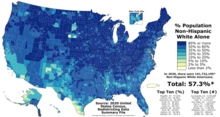 Non-Hispanic Whites by county in the United States | |
| Total population | |
|---|---|
| 203,890,513 (total)[1] 61.6% of the total U.S. population (2020)[1] 191,697,647 (white alone)[1] 57.84% of the total US population (2020)[1] and 12,192,866 (white in combination)[1] 3.67% of the total U.S. population (2020)[1] | |
| Regions with significant populations | |
| Throughout the United States, less common in Hawaii, California, New Mexico, and Texas. | |
| Languages | |
| Predominantly American English | |
| Religion | |
| 48% Protestant, 24% Unaffiliated, 19% Catholic, 3% Jewish, 2% Mormon, 2% Other Faiths (2014)[2] | |
| Related ethnic groups | |
| European Americans European diaspora Arab Americans Persian Americans |
Non-Hispanic Whites, Non-Latino Whites, or more simply White Americans, are Americans classified by the United States census as "white" and not Hispanic.[3][4] According to the United States Census Bureau yearly estimates, as of July 1, 2022, Non-Hispanic whites make up about 59.3% of the U.S. population, or 197,639,521 people.[5] The United States Census Bureau defines white to include European Americans, Middle Eastern Americans, and North African Americans.[6] Americans of European ancestry are divided into various ethnic groups. More than half of the white population are German, Irish, English, French and Polish Americans. Many Americans are also the product of other European groups that migrated to parts of the US in the 19th and 20th centuries, as the bulk of immigrants from various countries in Northern, Central, Eastern, and Southeastern Europe, as well as the Caucasus region, migrated to the United States.
The Non-Hispanic White population was heavily derived from British, as well as French settlement of the Americas, in addition to settlement by other Europeans such as the Germans (see Pennsylvania Dutch), Swiss, Dutch, Austrians, and Swedes that began in the 17th century (see History of the United States). The early Spanish presence in the country contributed a certain degree of that ancestry to the white population in parts of the south and southwest, as many Americans of Isleño, Basque, or other colonial Spanish heritage do not necessarily identify as "Hispanic or Latino" on the census, or are interchangeable with the "non-Hispanic White" category, as they lack any ties to Latin America, or recent ties to Spain.
Continued growth since the early 19th century is attributed to sustained very high birth rates alongside relatively low death rates among settlers and natives alike. There has also been periodically massive immigration from European and West Asian countries, especially Germany, Ireland, the Netherlands, France, as well as Poland, Russia, Norway, Finland, the Czech Republic, the countries of the former Ottoman Empire (Turkey, Lebanon, and Syria), Portugal, Serbia, Croatia, Hungary, Ukraine, Armenia, Iran and more. Significant migration of Jews of European, North African, and Middle Eastern descent into the United States is also notable.
The classification is also typically used to refer to an English-speaking American, in distinction to Spanish speakers.[7] In some parts of the country,[where?] the term Anglo-American is used to refer to non-Hispanic white English speakers as distinct from Spanish and Portuguese or Italian speakers although the term is more frequently used to refer to people of British or English descent and might include white people of Hispanic descent who no longer speak Spanish.[8][9][10]
- ^ a b c d e f "P2 HISPANIC OR LATINO, AND NOT HISPANIC OR LATINO BY RACE - 2020: DEC Redistricting Data (PL 94-171) - United States". United States Census Bureau.
- ^ "Religious Landscape Study".
- ^ "White persons, percent, 2000". 4 January 2011. Archived from the original on 4 January 2011. Retrieved 19 August 2017.
- ^ "U.S. Census website". United States Census Bureau. Retrieved 19 August 2017.
- ^ [1]
- ^ Karen R. Humes; Nicholas A. Jones; Roberto R. Ramirez, eds. (March 2011). "Definition of Race Categories Used in the 2010 Census" (PDF). United States Census Bureau. p. 3. Archived from the original (PDF) on March 3, 2014. Retrieved June 15, 2022.
- ^ "ROACH v. DRESSER IND. VALVE & INSTRUMENT DIVISION – 494 F.Supp. 215 (1980) – Leagle.com". leagle.com.
- ^ Oxford English Dictionary: "Anglo" North American A white English-speaking person of British or northern European origin, in particular (in the U.S.) as distinct from a Hispanic American or (in Canada) as distinct from a French-speaker.
- ^ Mish, Frederic C., Editor in Chief Webster's Tenth New Collegiate Dictionary Springfield, Massachusetts, U.S.A.:1994--Merriam-Webster See original definition (definition #1) of Anglo in English: It is defined as a synonym for Anglo-American--Page 86
- ^ "Anglo - Definitions from Dictionary.com; American Heritage Dictionary". Lexico Publishing Group. Archived from the original on 15 March 2008. Retrieved 2008-03-29.
Usage Note: In contemporary American usage, Anglo is used primarily in direct contrast to Hispanic or Latino. In this context it is not limited to persons of English or even British descent, making mother tongue (in this case English) the primary factor. This in parts of the United States such as the Southwest United States with large Hispanic populations, an American of Polish, Irish, or German heritage might be termed an Anglo just as readily as a person of English descent. However, in parts of the country where the Hispanic community is smaller or nonexistent, or in areas where ethnic distinctions among European groups remain strong, Anglo has little currency as a catch-all term for non-Hispanic whites. Anglo is also used in non-Hispanic contexts. In Canada, where its usage dates at least to 1800, the distinction is between persons of English and French descent. And in American historical contexts Anglo is apt to be used more strictly to refer to persons of English heritage, as in this passage describing the politics of nation-building in pre-Revolutionary America: "The 'unity' of the American people derived ... from the ability and willingness of an Anglo elite to stamp its image on other peoples coming to this country" (Benjamin Schwarz).
© MMXXIII Rich X Search. We shall prevail. All rights reserved. Rich X Search
